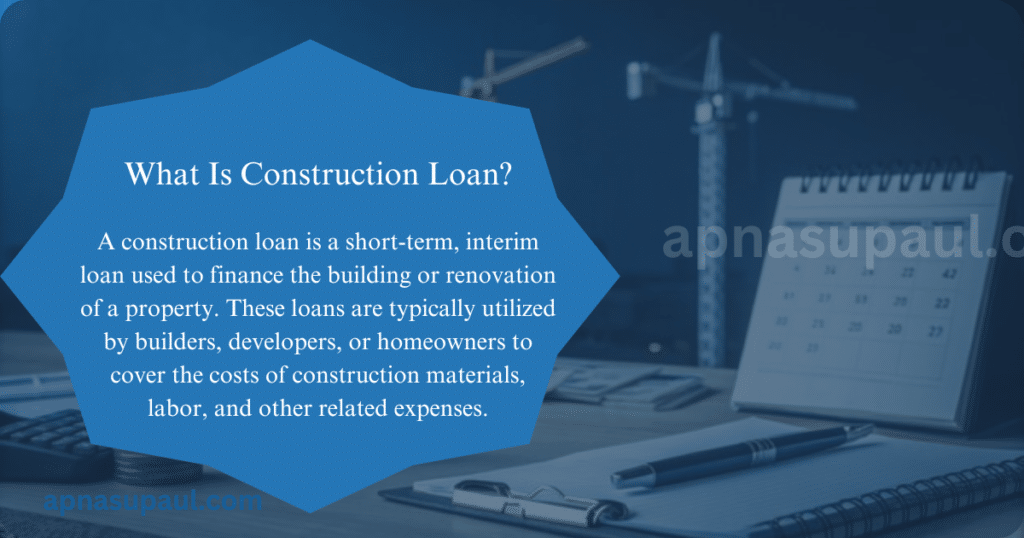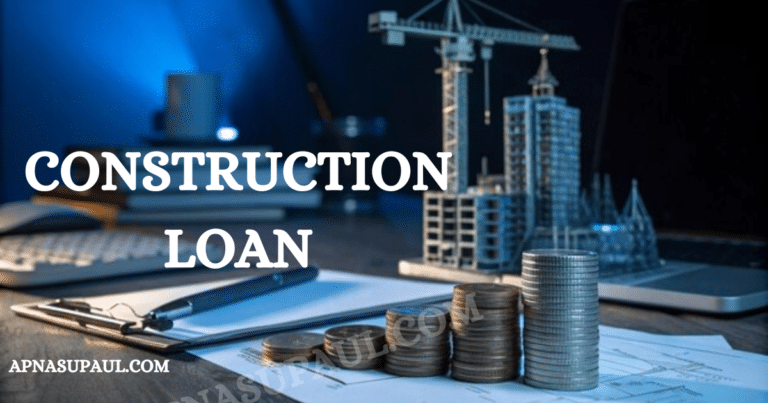What Is Construction Loan?

A construction loan is a short-term, high-interest loan designed to finance the building or renovation of a property. Typically, this type of loan is used by builders and homeowners for the construction of new homes or the renovation of existing ones.Here’s an overview of its key features:
1. Purpose
- New Construction: Funds the building of a new home or commercial property.
- Renovations: Provides financing for major renovations or remodeling of an existing structure.
2. Loan Structure
Interest-Only Payments: During the construction phase, borrowers often make interest-only payments on the funds that have been drawn, not on the total loan amount.
Short-Term: Construction loans are usually short-term, lasting from six months to a year, depending on the scope of the project.
Disbursement: Funds are typically disbursed in stages, or “draws,” based on the completion of certain construction milestones (e.g., foundation, framing, roofing).
How To Secure A Construction Loan
Securing a construction loan is an essential step for homebuilders and developers who need financing to cover the costs of building a property. Construction loans are typically short-term loans that cover the costs of construction before converting into permanent financing (like a mortgage) once the building is complete. Here are some key tips for homebuilders and developers to secure a construction loan.
1. Understand the Loan Types
Construction loans come in various forms, including:
- Construction-to-Permanent Loans: These loans convert into a permanent mortgage once the construction is completed.
- Stand-Alone Construction Loans: These are short-term loans for the construction phase. The borrower must apply for a separate mortgage once construction ends.
Understand which type of loan best suits your needs before applying.
2. Prepare a Solid Business Plan
Lenders want to know your project is feasible and profitable. A detailed business plan can include:
- A clear project timeline: Outline the construction phases, milestones, and estimated completion dates.
- Cost Breakdown: A detailed budget with estimates for labor, materials, permits, and other expenses.
- Market Analysis: Demonstrate demand for the property in the area.
3. Have a Detailed Construction Schedule and Budget
A comprehensive and realistic construction schedule, including the estimated time for each phase, will help reassure lenders that you can manage the project effectively. Similarly, a well-documented, detailed budget is critical. Lenders will examine your financial projections and costs to ensure that the project is financially viable.
4. Choose a Reliable Contractor
Most lenders will require you to work with a licensed, experienced contractor who has a proven track record of completing similar projects on time and within budget. Be prepared to provide information about your contractor’s qualifications, past projects, and financial stability.
5. Have a Strong Credit History
Lenders will scrutinize your credit history as it reflects your ability to repay the loan. Developers and homebuilders with a strong credit score will have better chances of securing a construction loan with favorable terms. If you or your business has a lower credit score, consider working to improve it or providing evidence of other financial strengths (e.g., substantial assets).
6. Provide Documentation of Equity and Assets
Lenders typically require a certain level of equity in the project. If you have significant personal or business assets, this can help demonstrate your ability to weather unexpected costs and challenges during construction. Be ready to provide tax returns, financial statements, and proof of any other assets that show you’re capable of contributing to the project.

7. Show a Strong Repayment Plan
Lenders need to know how the loan will be repaid. Typically, construction loans are repaid through the sale of the finished property or through a long-term mortgage. Outline your repayment strategy clearly, including estimated sales prices or other sources of income (e.g., rental income) once the project is finished.
8. Secure Pre-Approval for Permanent Financing
Many lenders will offer construction loans with the condition that you also secure permanent financing. You may want to get pre-approved for a mortgage or long-term loan before applying for a construction loan to demonstrate your ability to transition from short-term financing to permanent financing.
9. Ensure Sufficient Contingency Funds
Construction projects are often subject to unexpected issues like delays, cost overruns, or unforeseen complications. Lenders usually require a contingency fund (often 10-20% of the total project cost) to cover these risks. It’s essential to plan for these contingencies to avoid complications during construction.
10. Understand Loan Disbursement and Draw Schedule
Construction loans are usually disbursed in installments (referred to as “draws”) as the work progresses. The lender will typically release funds once certain construction milestones are reached. Be prepared for inspections and progress reports to verify that the work is on track before each disbursement.
11. Provide Proof of Insurance
Lenders will often require that you have comprehensive insurance coverage for the construction project. This may include general liability insurance, worker’s compensation, and builder’s risk insurance. Make sure you have the necessary policies in place before applying for the loan.
12. Have a Plan for Post-Construction
Once the construction is completed, the lender will want to know how you plan to transition the property to its final use. This could include details about selling or renting the property, securing tenants, or paying off the loan with a permanent mortgage.
13. Consider Working with a Broker or Financial Advisor
Navigating construction loans can be complex. Working with a mortgage broker or financial advisor experienced in construction loans can help you find the best terms and guide you through the process. They can also help you understand the specific requirements of different lenders and streamline the application process.
By following these tips and preparing thoroughly, homebuilders and developers can improve their chances of securing a construction loan and successfully completing their projects. Proper planning, documentation, and financial stability are key to obtaining favorable terms and managing the loan throughout the construction process.

